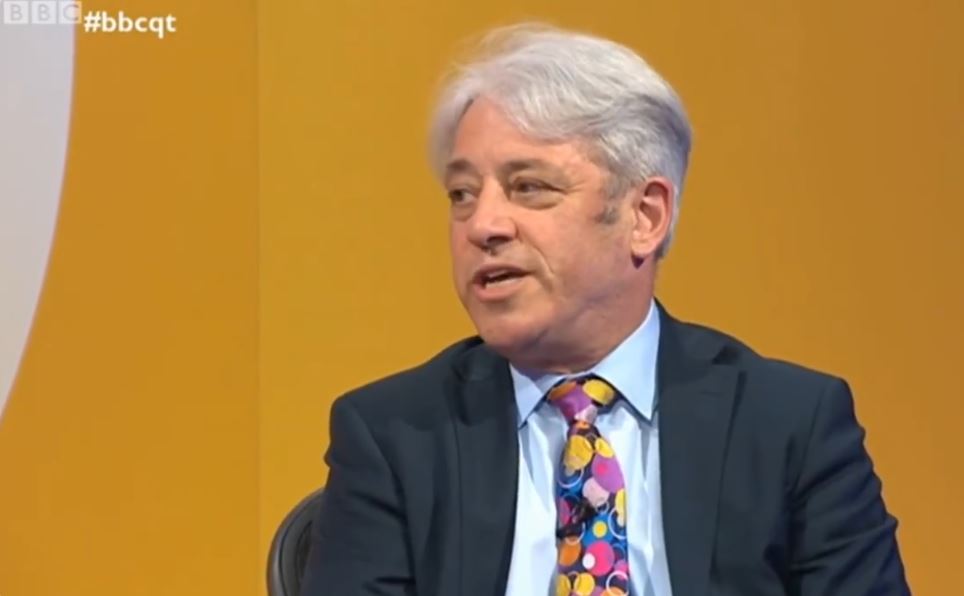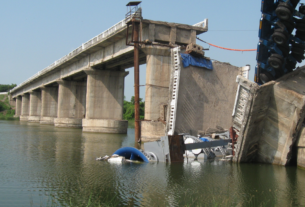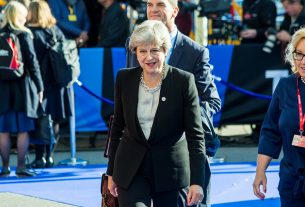The latest twist of post-Brexit relations with the EU has seen the UK prime minister send a Royal Navy ship to Jersey, a move mirrored by the French president who also sent a naval vessel to monitor the developing situation.
John Bercow, the former speaker of the House of Commons, said it was not a coincidence that the UK government sent a navy ship to Jersey on the same day elections were held across Britain.
Speaking on BBC One’s Question Time,, Bercow blasted the prime minister’s actions, calling them an “absurd act of gunboat diplomacy” and “juvenile”, adding: “Britain can do better than that.”
Invasion of French fishermen
Around 56 French fishing vessels arrived at the island on Thursday morning with a local fisherman describing the sight as looking like an invasion, with flares billowing from the boats.
The French fishermen threatened to blockade the harbour but left following “constructive” talks with the Jersey government over access to waters and licences to fish.
The protest was largely peaceful up until Jonathan Ruff, a Jersey property developer went out in his boat to “stick up” to the flotilla and do his “patriotic duty”. Ruff claims his boat was deliberately rammed by a French trawler.
“I couldn’t believe what he was doing. He deliberately sped up and went straight for me clipping my bow,” said Ruff.
Jersey hospitals could have power cut-off by France
Tensions escalated on Tuesday after France warned the breaching of terms of the post-Brexit deal could result in them cutting off the electricity supply to Jersey.
The Express report a jersey fisherman warning hospitals on the island will be left without power if France carries out its threat after French maritime minister, Annick Girardin, warned they are prepared to take “retaliatory measures” against the UK.
Fisherman Don Thompson told RT: “The electricity from France travels through Jersey and through to Guernsey as well. So that you know hospitals etc would be left without electricity.
“That is a really really harsh threat to make it, it is a very draconian measure.”
Former First Sea Lord of the Royal Navy warns marines might board boats
Elsewhere in the Express, a former First Sea Lord of the Royal Navy is warning Royal marines might be deployed to seize control of French fishing boats blockading Jersey. Lord West said marines on HMS Severn and HMS Tamar “are used to boarding foreign vessels and indeed UK vessels.
“We have done that over many years, if you go back to the Icelandic cod wars. So they will be working very hard to try to defuse any situations.
“But you can’t allow the vessels of another country to blockade one of our ports.”
West spoke about the same issue in December – before a deal between the UK and EU was agreed – defending “the threat of using the Royal Navy to protect UK waters from foreign fishing vessels”, saying: “It is absolutely appropriate for the navy to do as it is told by the government.”
Jersey – status, stats and trading agreement
Jersey is one of the Channel Islands, along with Guernsey, Alderney, Sark and Herm, that are self governing British crown dependencies. Sitting 14 miles from France and 85 miles from England, Jersey is the largest Channel Island at five miles long and nine miles wide, with a population of around 110,000.
It is part of the British Isles but self governing with its own financial and legal systems administered by the States Assembly comprising 49 elected members. The Lieutenant-Governor of Jersey is the personal representative of her Majesty the Queen, a position whose origin can be traced back to 1204 and a decision by islanders to side with the defeated King John who lost the Battle of Rouen to France’s King Philippe-Auguste.
Jersey has considerable autonomy but is not independent of the UK government which is responsible for the island’s international representation.
Before Brexit, the island was “treated as part of the European Union for the purposes of free trade in goods, but otherwise was not part of the EU”, with the island government’s website adding: “Following the UK referendum on EU membership, one of our key objectives was to protect, as far as possible, the Island’s key interests – including our relationship with our European partners.”
Under terms of the UK-EU Trade and Cooperation Agreement (TCA) – aka the Brexit deal struck in late December 2020 – Jersey’s exports to the EU are treated as if they are from the UK.
On March 1 this year Jersey signed a Memorandum of Understanding (MoU) with the UK to agree dispute resolution mechanisms with the EU under the TCA.




